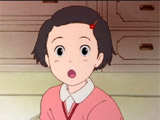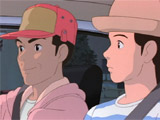

Quick Links:
Only Yesterday (Omohide Poro Poro)
Films like Only Yesterday are very unusual in the world of animation. Not only do we have a film that is told entirely from the perspective of a 27 year-old single woman, but it also caters to those of the not-so-young adult crowd. It's an endearing story that focuses on tuning in to one's past to make decisions for the future. Though it drags on perhaps a bit too long at some points, the story is different enough to make it work in the end.
Only Yesterday is the story of Taeko Okajima's life-changing vacation to the country. She had always wanted to have family in the country while growing up (her whole family lived in Tokyo), and she finally got her wish when her sister Nanako got married. After Nanako picks on her a little while for still being single, Taeko heads off to a home in Yamagata that's owned by Nanako's sister-in-law. As the trip starts, her childhood memories start to take over.
The Japanese title of the film is Omohide Poro Poro, meaning "memories in large drops," or alternatively, "trickling memories." A good portion of the movie is told in a set of flashbacks to Taeko's early life at 10 years old. More significant than the memories, though, is why she is recalling these particular things. As the movie progresses, the things she recalls grow more potent in nature, and have a steadily growing relevance to her current life.
Aside from the main plot, Only Yesterday has several interesting dialogues covering a range of ideas. For instance, one of the farmers points out to Taeko that people tend to come out there to get close to nature, but a good amount of the scenery is actually man made. Some of Taeko's memories cover interesting topics as well, such as when she didn't want to go to dinner with the family because she didn't have the same kind of purse as her sister. These stories and dialogues help the film offer a little more than just the story of Taeko's trip.
The film climaxes at the very end (during the ending credits), when her experiences as a ten year-old and at the country home culminate in a decision for her future. The progression of the story throughout the film is rather slow and can even be a bit of a bore in some moments, but the ending makes the journey worthwhile.
The background scenery and animation for this title are simply beautiful, at all times. Streams, fields, flowers, and mountains are given full focus at times, and the color choice is outstanding. The motion is smooth, but the movie is dialogue-centric so there isn't much movement anyway. The movie's character designs could be described as doing their job, but little else. It's obvious that the idea was to make the character designs humble to fit the country atmosphere, but there's a slight problem when the backgrounds are more alluring than the characters. Most Ghibli movies don't have this issue, so it was hard not to take notice.
An element of the film that was hardly noticeable (and appropriately so), was the music. The background music blends so well into the film that you can hardly tell it's there most of the time. Most of the scenes on the countryside don't have any music (also appropriately, since one wouldn't expect to hear music in the middle of a field or in the woods). The ending theme is a Japanese-language remake of Bette Midler's "The Rose," with lyrics by director Isao Takahata and performance by Harumi Miyako. The Japanese version is rather nice, but it's difficult to get excited about a song I've heard literally hundreds of times in English.
Only Yesterday is a film that not everyone will like, but can be viewed as a decent learning experience for all ages. I happened to enjoy the film for its dialogues and other commentary, despite the fact that I couldn't relate to how Taeko's memories caused a change in her. The potency of childhood memories (good or bad) is undeniable, though, and the film does well at getting that point across.
Distributor: Disney (Japan DVD Release) Creator: Isao Takahata / Studio Ghibli Released: 1991
Plot: B+ Character Design: B- Animation Quality: A+ Music: B Overall: B+



